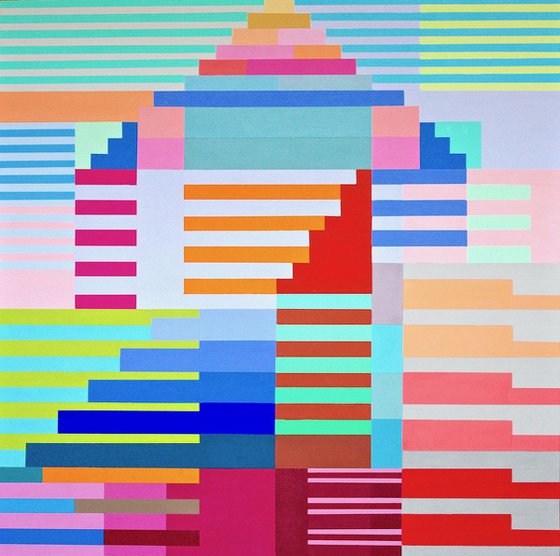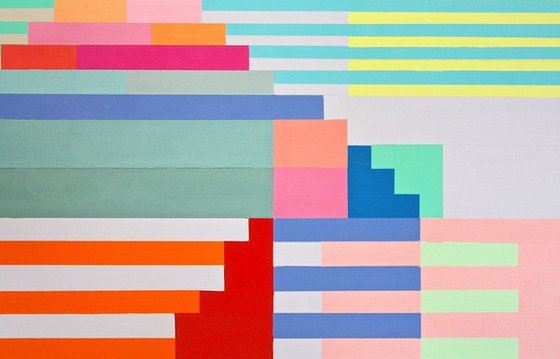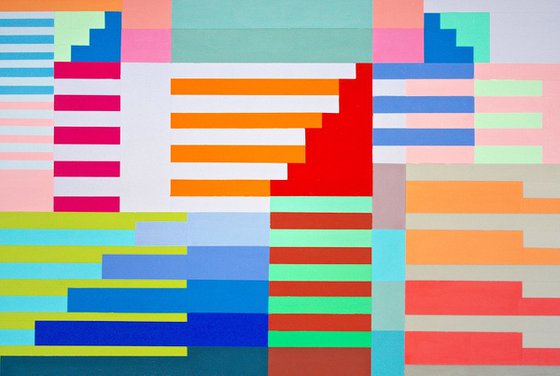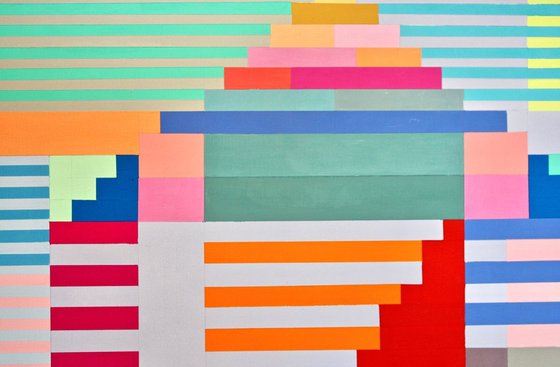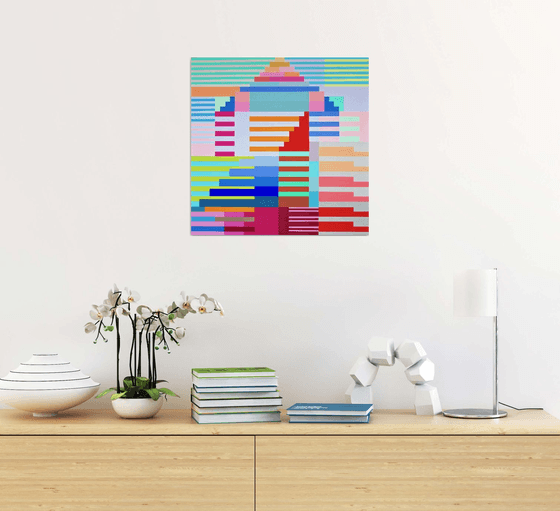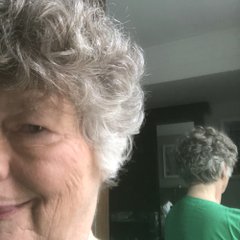- By medium
- By subject
- By budget
- Sales
- Gift cards
- Discover all art
- Artists
- Editors’ picks
- Ideas
Original artwork description:
This body of work, my geometric abstracts, are an extension of the tradition that was advanced in the 1960s and 70s, variously known as hard-edge abstraction or colorfield painting (but at times identified as minimal, cool, post-painterly, etc.). That work was derived from earlier twentieth century non-figural abstraction (de Stijl, Neoplasticism, Constructivism, late Cubism).
While I haven’t abandoned the easel and use paintbrushes, the surface is devoid of perceptible texture and traces of paint-handling, except for the slight ridges caused by the removed tape. I use geometric shapes (triangles, squares, rectangles, rhomboids, and trapeziums) arranged in “boxed” non-hierarchical patterns that structure the compositional field of the entire surface. My subject is color and line, and the tension that arises through the juxtapositions created by abrupt transitions between pattern areas. Patterns are individuated and used repeatedly across separate works, although not bound by color or scale. I think of each pattern as a block reminiscent of a batik tjap, or a syntactical unit such as a prepositional phrase or a subject and its predicate. Where a pattern is placed in relation to others in any given work, as well as variations in color and scale, offer infinite possibilities for structuring the surface field. While clarity of design has been a frequent goal of geometric abstract artists, because I may use a dozen or more ‘boxed’ patterns in any given work, the complexity multiplies.
I paint with gouache, which is matte, and individual patterns are autonomous and devoid of modulation or emotional expression (i.e., brushwork), keeping the work objective and impersonal. There’s no illusion of space or identifiable real-world subject.
Materials used:
gouache and wood
Glissando (2016) Gouache painting
by Gray Jacobik
1 Artist Reviews
£340.04 Sold
- Gouache painting on Panel / Board / MDF
- One of a kind artwork
- Size: 45.72 x 45.72 x 3.81cm (unframed) / 45.72 x 45.72cm (actual image size)
- Ready to hang
- Signed on the back
- Style: Geometric
- Subject: Abstract and non-figurative
Do you like this artwork?
This artwork has sold, but the artist is accepting commission requests. Commissioning an artwork is easy and you get a perfectly personalised piece.
Loading
Original artwork description
This body of work, my geometric abstracts, are an extension of the tradition that was advanced in the 1960s and 70s, variously known as hard-edge abstraction or colorfield painting (but at times identified as minimal, cool, post-painterly, etc.). That work was derived from earlier twentieth century non-figural abstraction (de Stijl, Neoplasticism, Constructivism, late Cubism).
While I haven’t abandoned the easel and use paintbrushes, the surface is devoid of perceptible texture and traces of paint-handling, except for the slight ridges caused by the removed tape. I use geometric shapes (triangles, squares, rectangles, rhomboids, and trapeziums) arranged in “boxed” non-hierarchical patterns that structure the compositional field of the entire surface. My subject is color and line, and the tension that arises through the juxtapositions created by abrupt transitions between pattern areas. Patterns are individuated and used repeatedly across separate works, although not bound by color or scale. I think of each pattern as a block reminiscent of a batik tjap, or a syntactical unit such as a prepositional phrase or a subject and its predicate. Where a pattern is placed in relation to others in any given work, as well as variations in color and scale, offer infinite possibilities for structuring the surface field. While clarity of design has been a frequent goal of geometric abstract artists, because I may use a dozen or more ‘boxed’ patterns in any given work, the complexity multiplies.
I paint with gouache, which is matte, and individual patterns are autonomous and devoid of modulation or emotional expression (i.e., brushwork), keeping the work objective and impersonal. There’s no illusion of space or identifiable real-world subject.
Materials used:
gouache and wood
14 day money back guaranteeLearn more
